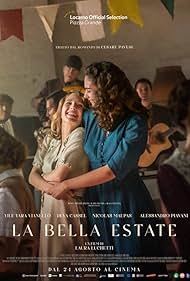But only by acknowledging this love can she be herself
Scenario
Seventeen-year-old Ginia experiences the ecstasy and turmoil that come with the mysterious journey to adulthood. An encounter with Amelia confronts her with new and shocking emotions.
Child in LovePlayed by Gabriele Graham Gasco
It’s frustrating to watch a film that seemingly heads down a particular trajectory but continually stumbles on the path it must take to get there. That’s exactly what happens in this period coming-of-age story set in 1938 Italy.
But even as this offering seemingly gets closer to that destination, it takes another unexpected left turn and subsequently leads to what the director herself admits is a deliberately ambiguous conclusion
Writer-director Laura Luchetti’s adaptation of Cesare Pavese’s 1949 novel about an impressionable 17-year-old seamstress (Yile Yara Vianello) who falls for an artist’s model (Deva Cassel) takes its time (and a lot of overlong detours) to arrive at a seemingly foregone conclusion. As a result, this is the kind of film that will likely leave many viewers scratching their heads and wondering, “What’s the point of all this?” The film is said to be intended to tackle a subject that was considered taboo at the time the story was set and the book was written, but that goal isn’t achieved as clearly as it could have been.
As a result, whatever noble intentions there may have been behind the inception of this production are decidedly obscured in the final cut
There are also a few fleeting references to the fascist sociopolitical conditions of the time (elements not included in the source material), but they’re never developed much, making their inclusion feel like a thrown-in afterthought. To its credit, “The Beautiful Summer” has beautiful photography, well-chosen locations that showcase the beauty of Turin, and a stirring soundtrack, but if those attributes are the best that can be said about the film, they don’t say much about the film as a whole.





 39/26
39/26